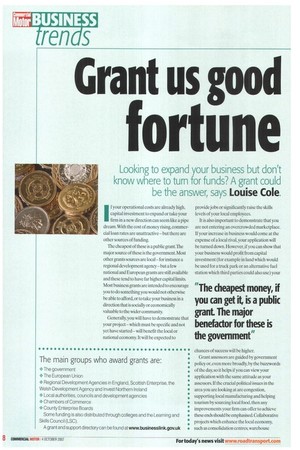Grant us good
Page 48

Page 49

If you've noticed an error in this article please click here to report it so we can fix it.
fortune
Looking to expand your business but don't know where to turn for funds? A grant could be the answer, says Louise Cole.
If your operational costs are already high, capital investment to expand or take your firm in a new direction can seem like a pipe drearn.With the cost of money rising, commercial loan rates are unattractive — but there are other sources of funding.
The cheapest of these is a public grant.The major source of these is the government. Most other grants sources are local — for instance a regional development agency—but a few national and European grants are still available and these tend to have far higher capital limits. Most business grants are intended to encourage you to do something you would not otherwise be able to afford,or to take your business in a direction that is socially or economically valuable to the wider community.
Generally, you will have to demonstrate that your project —which must be specific and not yet have started —will benefit the local or national economy. It will be expected to provide jobs or significantly raise the skills levels of your local employees.
It is also important to demonstrate that you are not entering an overcrowded marketplace. If your increase in business would come at the expense of a local rival, your application will be turned down. However,if you can show that your business would profit from capital investment (for example in land which would be used for a truck park or an alternative fuel station which third parties could also use) your chances of success will be higher.
Grant assessors are guided by government policy or, even more broadly, by the buzzwords of the day, soil helps if you can view your application with the same attitude as your assessors. If the crucial political issues in the area you are looking at are congestion, supporting local manufacturing and helping tourism by sourcing local food, then any improvements your firm can offer to achieve these ends should be emphasised. Collaborative projects which enhance the local economy, such as consolidation centres, warehouse sharing schemes and the like could all prove to be winners.
Grant applications take considerable work, and will probably not yield more than 50% of your capital needs—they are not designed to fund the day-to-day running of your business or place public money into a venture in which you won't risk your own. Applications can take weeks or months to process (up to a year for EU money);there is no guarantee of success: and you cannot start your project until funds are released. If you have already started the project the assessors will assume you did not need public money to make it happen.
Why, then, should you bother applying for such grants? Because, having said all that, there are millions of pounds available to emerging and growing enterprises in the UK, and several organisations which can help you find a source of income to help your firm.
If you want to undertake a capital investment project or invest in retraining, then receiving a chunk of money you don't have to repay could make all the difference. •


























































































































































































